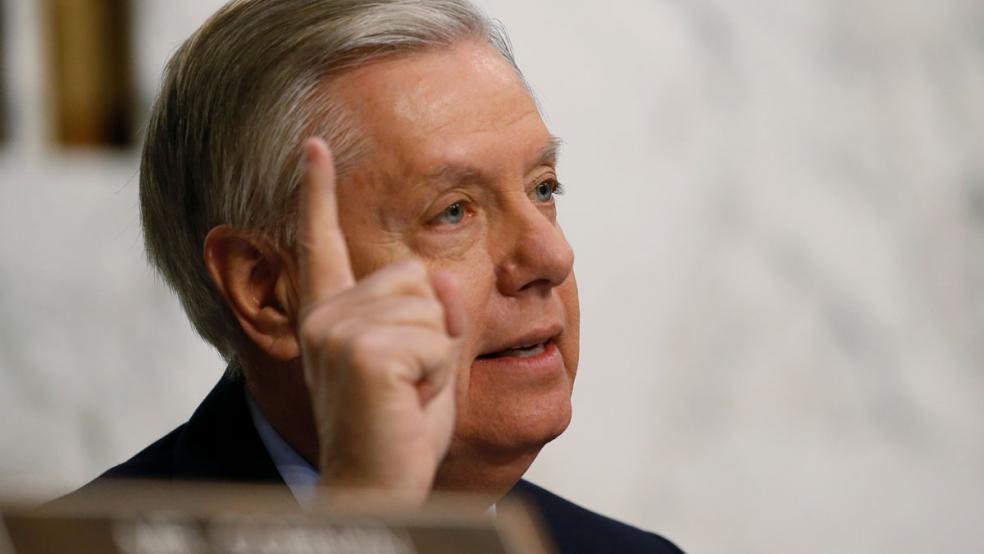Senate Majority Leader Mitch McConnell earlier this week seemed to be trying to assert some control over his chamber at a time when Washington, in general, has gone haywire.
McConnell announced that he planned to force the Senate to remain in session two weeks into what was supposed to be a month-long recess, and he promised that Senate Republicans would release a new version of their plan to repeal and replace the Affordable Care Act — hopefully one that could overcome resistance from within the caucus and come to the floor for a vote as early as next week.
Related: McConnell Tries Business as Usual Amid a Trump Team Disaster
McConnell’s plan to get the Senate GOP all pulling on the same rope is not going well.
On Thursday morning, with an 11:30 meeting scheduled for McConnell to present his new bill to his members, Republican Sens. Lindsey Graham of South Carolina and Bill Cassidy of Louisiana appeared on CNN to announce that they would be proposing an alternative to the GOP leadership plan.
The Graham-Cassidy plan would leave some of the Affordable Care Act’s taxes in place, but would take those funds and turn them over to state governments in the form of a block grant, leaving state lawmakers and governors to reform the health insurance system within their own borders.
“In a nutshell, we’re keeping the taxes in place on the wealthy, we’re repealing the individual mandate and the employer mandate, and the medical device tax that 75 senators voted to repeal,” Graham said. “There’s about $500 billion in money, rather than trying to run health care from Washington, we’re going to block grant it to the states, and here’s what will happen. If you like Obamacare, you can re-impose the mandates at the state level. You can repair Obamacare if you think it needs to be repaired. You can replace it if you think it needs to be replaced. It will be up to the governors. They’ve got a better handle on this than any bureaucrat in Washington.”
Cassidy described the plan as “giving money back to the states to make sure that those who have needs are able to have their needs addressed.” He said that if their proposal were coupled with an element of Sen. Ted Cruz’s proposal to allow people to use funds from tax-exempt Health Savings Accounts to pay for insurance premiums, “you can imagine that a state would then put money into someone’s health savings account with which she could then purchase the insurance which she needed.”
Related: Why a Bipartisan Health Care Compromise Is Simply a Delusion
As Graham and Cassidy were describing their alternative proposal, lawmakers were getting their first sense of what the latest iteration of the GOP leadership’s plan looks like.
The proposed legislation, which runs to 171 pages, is similar to an earlier proposal that couldn’t even summon enough support to get senators to open debate on it, but contains a number of changes meant to win the support of reluctant Republicans. Because Republicans have only a slim majority in the Senate, losing as few as three votes would result in the bill failing to pass, even under budget reconciliation rules that prevent a Democratic filibuster.
Rather than a straight repeal of the ACA, which Republican hardliners have been demanding for more than seven years, McConnell’s latest bill leaves in place several of the law’s taxes aimed at high-income Americans. It would use that revenue to provide premium subsidies to low-income Americans, and to direct tens of billions of dollars to programs targeting the epidemic of opioid abuse. Those changes are meant to appease senators who were concerned that the proposal would place too much of a financial burden on low-income Americans while providing a large tax cut to the wealthy.
Related: Five Ways Republicans Can Regain their Mojo on Health Care
However, the new Senate proposal would still make deep cuts to Medicaid spending by block-granting federal Medicaid funds and restricting the rate at which the money allocated to states increases over the years.
The proposal also includes changes offered by Cruz, including a provision that would allow insurers to provide bare-bones insurance coverage currently illegal under the ACA, just as long as the company offering the policy still sells at least one offering that is ACA-compliant. The Cruz plan also contains the proposal to allow consumers to use funds set aside in HSAs to pay for premiums.
A key difference between McConnell’s proposal and the offering that Graham and Cassidy described on Thursday is the degree to which authority is returned to the states. While the leadership plan gives states much more authority over how to spend Medicaid funds, the Graham-Cassidy proposal appears far more radical — delegating control over the entire structure of the health insurance market to governors and state legislators.
In a GOP caucus that has many members for whom the transfer of control over policy matters to the states is at least theoretically attractive, the Graham-Cassidy proposal might be able to draw support from members who might otherwise align behind the leadership bill.
Related: Why Ted Cruz's Health Care Fix Can't Save the GOP's Bill
On CNN, though, Graham insisted that there is no conflict between the two proposals.
“We’re gonna support Mitch’s effort with his new plan, but we want an alternative, and we’re going to see which one can get 50 votes,” he said. “We’re not undercutting Mitch, he’s not undercutting us.”





